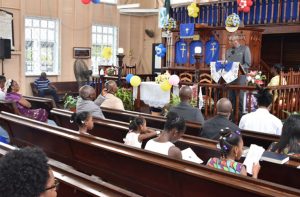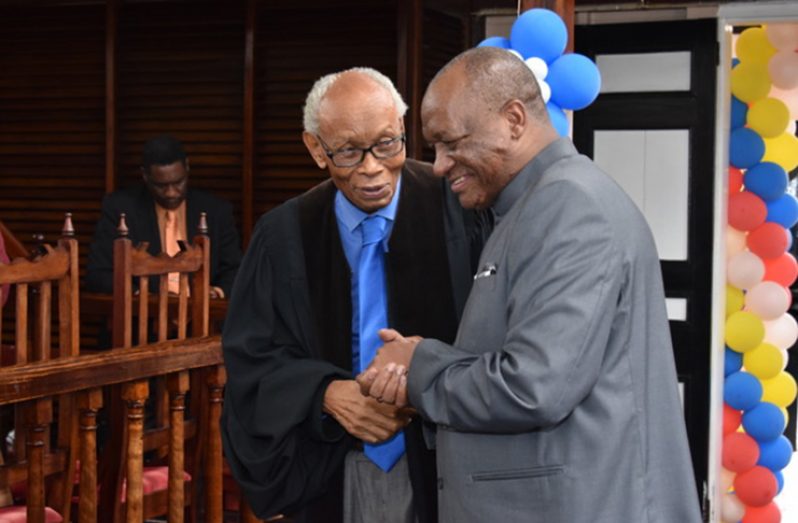…Min Harmon challenges Smith Memorial Congregational Church
MINISTER of State, Mr. Joseph Harmon on Sunday challenged the Bishop and congregation of the Smith Memorial Congregational Church to reclaim its position as a beacon of hope for communities across Guyana.
The minister of state, who was at the time addressing worshippers at the church’s 175th Anniversary service, reminded that the church has a role to play in the areas of social, community and economic development as it once did during the period of slavery and at the time of emancipation. “The Church should return to its role as a social leader. It is a credible organisation in this community. It should utilise this public trust to solve social problems – such as domestic violence, drug abuse, poverty, teenage pregnancy and school absenteeism. Smith Memorial Congregational Church, in the Congregational tradition of service, should become a beacon of hope for its communities once again,” he stated.
Minister Harmon noted that congregationalism and service to communities are inseparable and the bonds between church and communities should therefore be reinforced. “The church calls on us to do good through service to others, including those within our communities. The Smith Memorial Congregational Church is married to the proud tradition of community service. The Smith Memorial Congregational Church should uphold this proud legacy. The church, through its service to this and neighbouring communities, should seek to become a catalyst for good, as was 175 years ago. This would be a fitting and forward-looking way in which to celebrate the 175th anniversary of its establishment,” Minister Harmon said.
Congregationalism, he stated, came to Guyana 210 years ago as part of the work of the London Missionary Society to minister almost exclusively to Africans. It became a beacon of hope in desperate and despondent times, as Congregationalists supported Africans in their struggles both during and after enslavement.

“Freed Africans, after Emancipation, initiated the Great Village Movement. Cotton, coffee and sugar plantations were purchased and free human settlements were erected in their place. Congregationalism became a bedrock upon which this movement was erected. It inspired the freed Africans to establish churches in many of these free villages. The descendants of the founders of these villages, in turn, looked to the church to continue God’s work – churches to worship God, homes to keep their families together, schools to provide education to their children and farms to develop strong economies. Communities should be maintained as vital centres of spiritual life, blessed with the moral legitimacy and the material resources necessary for promoting the common good,” Minister Harmon told the congregation.
Churches, he added, became community centres and classrooms. They were part of the social architecture of their communities, supporting the four pillars – faith, family, farm and the school. Congregationalism mentored local leaders, demonstrating the ability of locals to manage their own affairs, he added. Guyana, the minister said, owes a debt of gratitude to the Congregational Church as it pioneered education before and after Emancipation, supported community development and provided assistance to those in need. As such, he said that the church should deepen its involvement and integration in the community. It should work in, for and with the community to provide opportunities, especially for the young people, he declared.
The religious institution was opened on November 24, 1843 as a tribute to the work and suffering of the late Reverend John Smith who was sentenced to death. Smith, a London Missionary Society minister was sentenced to death by hanging for the role he allegedly played in the East Coast Demerara Slave Insurrection in 1823. According to the church’s historical records, Smith died a prisoner on death row on February 6, 1824. He was referred to as the ‘Demerara Martyr’ as a result of the circumstances surrounding his death. Reverend John Smith came to British Guiana in February, 1817 to succeed Reverend John Wray who was the pioneer missionary of the London Missionary Society at Bethel Chapel, Le Resouvenir, East Coast Demerara. It was recorded that Smith, gave instructions to the slaves and disobeyed the rules of the slave-owners by teaching their slaves to read the Bible and Catechism. (Ministry of the Presidency)



.jpg)










